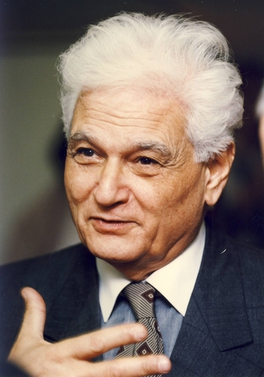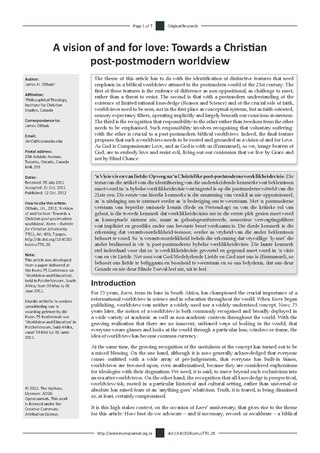
Jacques Derrida was an Algerian-born French philosopher. He developed the philosophy of deconstruction, which he utilized in a number of his texts, and which was developed through close readings of the linguistics of Ferdinand de Saussure and Husserlian and Heideggerian phenomenology. He is one of the major figures associated with post-structuralism and postmodern philosophy although he distanced himself from post-structuralism and disowned the word "postmodernity".

Hermeneutics is the theory and methodology of interpretation, especially the interpretation of biblical texts, wisdom literature, and philosophical texts. As necessary, hermeneutics may include the art of understanding and communication.
The following outline is provided as an overview of and topical guide to Christian theology:

The Institute for Christian Studies is a private, graduate-level Reformed philosophical and theological school in Toronto, Ontario. At ICS, students and faculty take part in shared learning through participatory seminars, mentoring, and an interdisciplinary approach to study. There are several unrelated institutions bearing similar names.
John David Caputo is an American philosopher who is the Thomas J. Watson Professor of Religion Emeritus at Syracuse University and the David R. Cook Professor of Philosophy Emeritus at Villanova University. Caputo is a major figure associated with postmodern Christianity and continental philosophy of religion, as well as the founder of the theological movement known as weak theology. Much of Caputo's work focuses on hermeneutics, phenomenology, deconstruction, and theology.
Postmodern theology, also known as the continental philosophy of religion, is a philosophical and theological movement that interprets Christian theology in light of post-Heideggerian continental philosophy, including phenomenology, post-structuralism, and deconstruction.
Paleo-orthodoxy is a Protestant Christian theological movement in the United States which emerged in the late 20th and early 21st centuries and which focuses on the consensual understanding of the faith among the ecumenical councils and Church Fathers. While it understands this consensus of the Church Fathers as orthodoxy proper, it calls itself paleo-orthodoxy to distinguish itself from neo-orthodoxy, a movement that was influential among Protestant churches in the mid-20th century.
Postliberal theology is a Christian theological movement that focuses on a narrative presentation of the Christian faith as regulative for the development of a coherent systematic theology. Thus, Christianity is an overarching story, with its own embedded culture, grammar, and practices, which can be understood only with reference to Christianity's own internal logic.

James Herman Olthuis is an interdisciplinary scholar in ethics, hermeneutics, philosophical theology, as well as a theorist and practitioner of psychotherapy of a kind he calls "relational psychotherapy".
Philosophical theology is both a branch and form of theology in which philosophical methods are used in developing or analyzing theological concepts. It therefore includes natural theology as well as philosophical treatments of orthodox and heterodox theology. Philosophical theology is also closely related to the philosophy of religion.
Neo-Calvinism, a form of Dutch Calvinism, is a theological movement initiated by the theologian and former Dutch prime minister Abraham Kuyper. James Bratt has identified a number of different types of Dutch Calvinism: The Seceders, split into the Reformed Church "West" and the Confessionalists; the neo-Calvinists; and the Positives and the Antithetical Calvinists. The Seceders were largely infralapsarian and the neo-Calvinists usually supralapsarian.

Alasdair John Milbank is an English Anglo-Catholic theologian and is an Emeritus Professor in the Department of Theology and Religious Studies at the University of Nottingham, where he is President of the Centre of Theology and Philosophy. Milbank previously taught at the University of Virginia and before that at the University of Cambridge and the University of Lancaster. He is also chairman of the trustees of the think tank ResPublica.
Radical orthodoxy is a Christian theological and philosophical school of thought which makes use of postmodern philosophy to reject the paradigm of modernity. The movement was founded by John Milbank and others and takes its name from the title of a collection of essays published by Routledge in 1999: Radical Orthodoxy: A New Theology, edited by Milbank, Catherine Pickstock, and Graham Ward. Although the principal founders of the movement are Anglicans, radical orthodoxy includes theologians from a number of ecclesial traditions.
Graham John Ward is an English theologian and Anglican priest who has been Regius Professor of Divinity at the University of Oxford since 2012.

Phillip Blond is an English political philosopher, Anglican theologian, and director of the ResPublica think tank.
Peter W. Ochs is the Edgar M. Bronfman Professor of Modern Judaic Studies at the University of Virginia, where he has served since 1997. He is an influential thinker whose interests include Jewish philosophy and theology, modern and postmodern philosophical theology, pragmatism, and semiotics. Ochs coined the term "scriptural reasoning" and is the co-founder of the Society for Scriptural Reasoning, which promotes interfaith dialog among Christians, Jews, and Muslims through scriptural study groups. He is also a co-founder of the Children of Abraham Institute, which promotes interfaith study and dialog among members of the Abrahamic religions.

Catherine Jane Crozier Pickstock is an English philosophical theologian. Best known for her contributions to the radical orthodoxy movement, she has been Norris-Hulse Professor of Divinity at the University of Cambridge since 2018 and a fellow and tutor of Emmanuel College, Cambridge. She was previously Professor of Metaphysics and Poetics.
The following is a bibliography of John D. Caputo's works. Caputo is an American philosopher closely associated with postmodern Christianity.
William Franke is an American academic and philosopher, professor of Comparative Literature at Vanderbilt University. A main exposition of his philosophical thinking is A Philosophy of the Unsayable (2014), a book which dwells on the limits of language in order to open thought to the inconceivable. On this basis, the discourses of myth, mysticism, metaphysics, and the arts take on new and previously unsuspected types of meaning. This book is the object of a Syndicate Forum and of a collective volume of essays by diverse hands in the series “Palgrave Frontiers in Philosophy of Religion”: Contemporary Debates in Negative Theology and Philosophy. Franke's apophatic philosophy is based on his two-volume On What Cannot Be Said: Apophatic Discourses in Philosophy, Religion, Literature, and the Arts (2007), which reconstructs in the margins of philosophy a counter-tradition to the thought and culture of the Logos. Franke extends this philosophy in an intercultural direction, entering the field of comparative philosophy, with Apophatic Paths from Europe to China: Regions Without Borders. In On the Universality of What is Not: The Apophatic Turn in Critical Thinking, Franke argues for application of apophatic thinking in a variety of fields and across disciplines, from humanities to cognitive science, as key to reaching peaceful mutual understanding in a multicultural world riven by racial and gender conflict, religious antagonisms, and national and regional rivalries.







